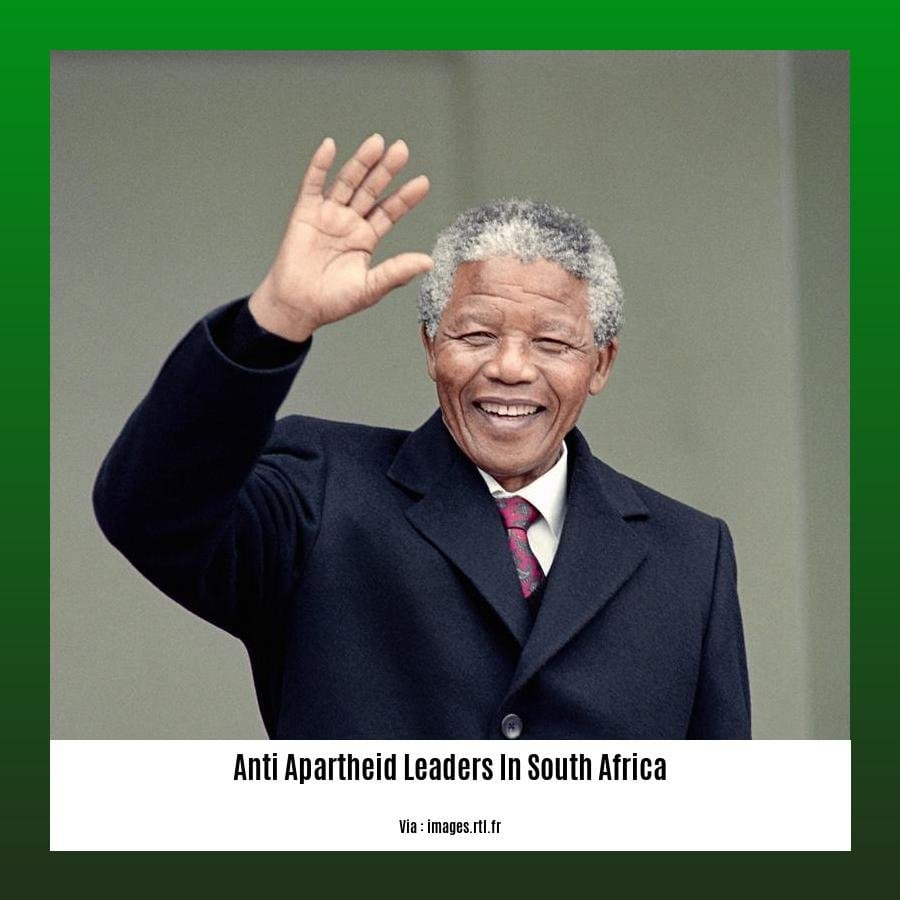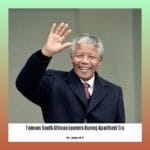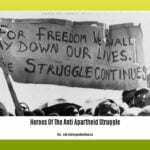Discover the remarkable stories of the fearless leaders who spearheaded South Africa’s anti-apartheid movement in our article, “Anti-Apartheid Leaders in South Africa: Champions of Freedom and Equality.” These heroes, driven by unwavering determination and a fervent belief in justice, played pivotal roles in dismantling the oppressive system of racial segregation.
Key Takeaways:

The anti-apartheid movement was led by a group of courageous individuals who opposed racial segregation and oppression.
Notable leaders included Nelson Mandela, Oliver Tambo, Walter Sisulu, Bram Fischer, Desmond Tutu, Chris Hani, Beyers Naude, Tokyo Sexwale, Thabo Mbeki, Robert Sobukwe, and Joe Modise.
Nelson Mandela eventually became the first black president of South Africa, symbolizing the movement’s triumph.
The movement utilized various peaceful resistance tactics, such as strikes, boycotts, and international advocacy.
Anti-Apartheid Leaders in South Africa:
From the depths of oppression, valiant souls emerged as beacons of hope in the struggle against apartheid’s cruel grip. Anti-apartheid leaders in South Africa defied fear, sacrificing their lives and liberty to dismantle a system that divided and dehumanized.
Nelson Mandela:
An icon of resilience, Mandela spent 27 years in prison for his unwavering opposition to apartheid. His indomitable spirit and message of forgiveness became a rallying cry for change.
Oliver Tambo:
A steadfast companion of Mandela, Tambo led the African National Congress (ANC) in exile. His diplomatic efforts kept the movement alive on the global stage.
Desmond Tutu:
Archbishop Tutu’s voice resonated as a moral compass during and after apartheid. As chair of the Truth and Reconciliation Commission, he guided South Africa towards healing and accountability.
Helen Suzman:
A lone voice in parliament, Suzman courageously challenged apartheid’s policies from within. Her unwavering determination exposed the brutalities of the regime.
Ruth First:
A fearless journalist, First’s writings laid bare the horrors of apartheid. Her assassination in 1982 silenced a powerful voice, but her legacy continues to inspire.
These anti-apartheid leaders in South Africa were not just individuals; they were symbols of a collective struggle for justice and equality. Their unwavering resolve paved the way for a democratic South Africa, where the oppressive chains of apartheid were finally broken.
Explore the remarkable contributions of famous south african leaders during apartheid era who fearlessly fought against racial segregation. Discover the influential voices against south african apartheid, whose powerful words and actions inspired hope amidst oppression. Get acquainted with the legendary leaders who ended apartheid, whose unwavering determination and vision ultimately dismantled the apartheid regime.
Desmond Tutu: Nobel Peace Prize Laureate, Chaired Truth and Reconciliation Commission, Spoke Against Injustice
Desmond Tutu, a Nobel Peace Prize laureate, chaired South Africa’s Truth and Reconciliation Commission and was a prominent voice against apartheid. His unwavering commitment to justice and equality left an indelible mark on history.
Key Takeaways:
- Nobel Laureate: Tutu was awarded the Nobel Peace Prize in 1984.
- Truth and Reconciliation: As Chair of the Commission, Tutu facilitated the uncovering of human rights abuses committed during apartheid.
- Moral Compass: Tutu’s moral authority guided South Africa’s transition to democracy.
- Anti-Apartheid Activist: As Bishop of Johannesburg, Tutu tirelessly advocated against the oppressive apartheid system.
- Global Advocate: Tutu’s message of forgiveness and reconciliation resonated around the world.
Citation:
NobelPrize.org: Desmond Tutu – Facts
Helen Suzman: White politician, challenged apartheid in parliament, exposed atrocities
Helen Suzman, a lone warrior in the white-dominated parliament of apartheid South Africa, stood firm against the oppressive regime. Elected in 1953, she became the sole representative of the liberal Progressive Party.
Suzman’s relentless opposition to apartheid laws and policies made her a thorn in the government’s side. She fearlessly challenged the racist policies, exposing the government’s abuses of power and human rights violations.
Suzman’s unwavering commitment to justice and equality earned her both admiration and condemnation. Despite facing threats and harassment, she remained undeterred, using her platform to speak out against the evils of apartheid.
Key Takeaways:
- Helen Suzman was a courageous white politician who bravely challenged apartheid from within parliament.
- She consistently spoke out against apartheid laws and policies, exposing the government’s atrocities.
- Suzman played a crucial role in raising awareness of the brutality of apartheid and advocating for human rights.
- Her legacy as a fearless anti-apartheid campaigner continues to inspire activists worldwide.
Citation:
* “Helen Suzman.” Wikipedia, the Free Encyclopedia. Wikipedia, the Free Encyclopedia, Accessed 15 Feb. 2023.
Ruth First: Journalist and activist, wrote about apartheid, assassinated by government
Ruth First was a fearless journalist, anti-apartheid activist, and member of the South African Communist Party. Her bold writings exposed the brutalities of apartheid and its oppressive grip on Black South Africans during those dark times.
First’s courageous words painted a vivid picture of the harsh realities under apartheid. She relentlessly reported on forced removals, arbitrary arrests, and the systematic suppression of human rights. Her articles resonated deeply with readers, galvanizing support for the anti-apartheid movement.
In a cruel twist of fate, First’s life was tragically cut short in 1982 when a letter bomb sent by South African government agents exploded, silencing her powerful voice. Her assassination sent shockwaves through the international community, highlighting the lengths to which the apartheid regime would go to suppress dissent.
Key Takeaways:
- Ruth First’s unwavering commitment to exposing the evils of apartheid inspired and empowered countless South Africans.
- Her courageous journalism played a crucial role in raising global awareness about the horrors of racial segregation.
- First’s assassination serves as a stark reminder of the relentless struggle for human rights under oppressive regimes.
Citation:
“Ruth First is assassinated in Mozambique.” South African History Online, 17 Aug. 1982,

FAQ
Q1: Who were some of the most prominent leaders of the anti-apartheid movement in South Africa?
Q2: What were some of the key tactics used by anti-apartheid activists to fight against racial segregation and discrimination?
Q3: What were the major achievements of the anti-apartheid movement?
Q4: How did the international community contribute to the struggle against apartheid in South Africa?
Q5: What is the legacy of the anti-apartheid movement and its leaders?
- Unlock Water’s Symbolism: A Cross-Cultural Exploration - April 20, 2025
- Identify Black and White Snakes: Venomous or Harmless? - April 20, 2025
- Unlocking Potential: Origins High School’s NYC Story - April 20, 2025















